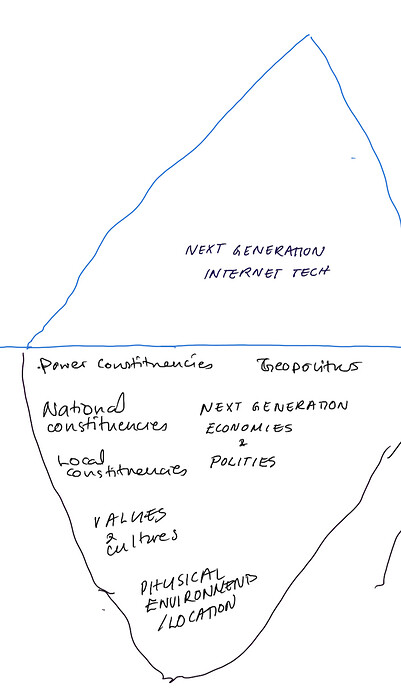The Community Journalism Digest: An ambitious framework, where social and human values and technological design co-shape the internet.
- Wellbeing and welfare
- Distributed Work & Business
- Green Transition
- Resilience
- Economies
- Time perspective
Community conversations about the next generation internet and what it means for it to truly support the transition to a better future of people and planet.
Environmental sustainability is vital and well researched but social and human sustainability should also be included; the project, in fact, remains very techcentered and misses social and human sustainability and rights outside of the digital realm.”*
How do we structure and weave all of this together into a coherent digest/book?
There are several perspectives/premises that are more or less institutionally legitimised.
-
The one closest to the feedback we have gotten is one that puts human wellbeing at the centre and views everything through the lens of its effect on wellbeing.
-
Another starting point (towards we were pushed earlier in the project) takes specific technologies as points of departure for discussion.
-
A third departs from “hot topics” that are at the top of the current political agenda (they are unstable and change from month to month or after big occurrences such as covid this year). E.g What has Covid taught us about a Next Generation Internet that serves people, communities and planet in the near future?.
-
Then there are ones that can come out of conversations instigated on the platform…*e.g Matt’s critique of the rush towards more and faster when it comes to connectivity and data.*here I would need input from the ethnography team to get to the content as the ethnography codes are many and the corpus huge
The objective: Gather thoughts, and propose solutions
Many of the conversations either point to how people currently are using, affected by, critiquing or building tech right now. Our work is to compile and make sense of this, then come up with proposals for solutions and recommendations for policies that support those solutions…
As part of this mission we are going to do active outreach to identify people who are already making progress in the solutions/recommendations - oriented thinking or building. This can help us to find new connections between different issues and solutions that people are exploring. Why? Well because a lot of the time what the people working on to solve one issue, can have positive effects on other issues. Take community gardening as an example from a different domain. The protagonist of such a project may be doing it for one reason (greening the city), but someone else looking at another issue might pick up on the fact that it is getting elderly people in the neighbourhood to exercise more, meet others etc. And connect it as a public health solution. For the protagonists this could mean they get more support from unexpected sources.
Proposals already developed by the NGI Forward project
Possible Frameworks for structuring the content/discussion?
Why do this? Because in a discussion about any complex topic, our underlying perspective shapes where we decide to direct our gaze, and how we understand what we think we see. A lot of the time these underlying assumptions or premises are like invisible sunglasses with tinted lenses - depending on the colour of the lens of the sunglasses you happen to be wearing, the same things will look different. And if you are discussing the colour of an object with someone else who is wearing different coloured lenses…
Below is a list that I aggregated top of mind, perhaps there are others that ought to be included? Feel free to add them to this wiki…
here @matthias EarthOS /autarchy framework could also be interesting to add? What do you think?
Wellbeing of people - centric
This is a visualisation of the data collected on Wellbeing indicators developed by COE through a consultation with citizens in 200 cities all over the continent (background info)
Technology- centric
This was derived from the list of topics that we received at the beginning of the project.
Ecosystems-centric
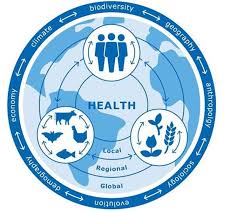
Social-Ecological Wiring - Iceberg
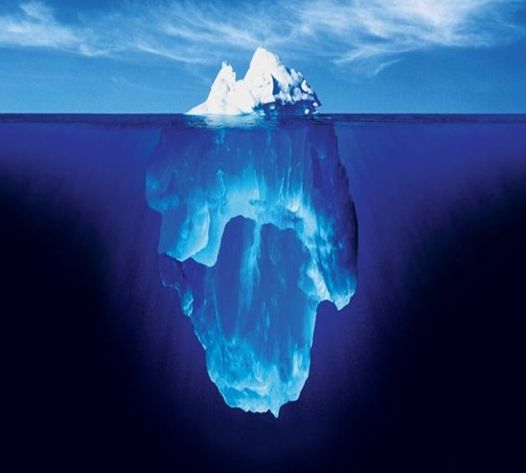
How we go about producing the community journalism digest
-
Cluster the materials we already have on the platform around a small number of headers/ key questions or topics they point to - this requires us to chose which
- List of best of posts: https://edgeryders.eu/t/high-quality-posts-ngi/14866
- List of content organised by the key ethnocodes:
// Need a simple list of the key ones as relevant to the themes and questions described below - (help @katejsim or @Leonie ?)
-
AMAs (the threads and the summaries)
-
Produce Interviews and or surveys with people that fit into the commission’s categories of who they want us to include.
-
Get Copywriter to produce short texts that weave together the different pieces of content that we have clustered under the different headers.
-
Stick it all into a book (give it to a graphic designer to do the layout and add some illustrations.
We have been asked to include content that explores the following themes:
-
digital labour: “digital labour” is not a code currently, but we have a lot around
workand interesting discussions aboutimagining the futureandimagining alternativesaround that. We also have codes specifically aboutcontent moderationandcompensating moderators -
health:
healthis a core code with several related codes likehealthcare,mental healthandpublic health -
alternatives to surveillance capitalism and sharing economy: We have a lot going on around “alternatives to surveillance capitalism and sharing economy”. See our NGI Code Review Wiki for a nice detailed overview, e.g: t’s clear even at this level that the use of
personal datasets up atrade-offfor a lot of participants. Indecision-makingabout sharing or protectingpersonal data, community members areconsidering larger contextaround its use andassessing the impactof the trade-off.costis also a key consideration.Personal dataalso connects strongly, if we move south, toagency, in a highly illustrative cluster withcontrolanduser experience. We see, again, trade-offs set up – betweenuser controlanduser experience, raising questions about what one gets when one gives uppersonal data, and how much control is possible. Community members also raise questions about the effort andcostof controlling personal data in the current environment, when responsibility is highly individualised (individualising responsibilityis a salient code at a lower level of co-occurrences). ALSOopen sourcealso strongly connects withprivacy, an extremely central node in the conversation.privacyconnects back topersonal data, and we see an illustrative network of privacy concerns articulated by the community: aroundsmart citiesandhuman rights,covid-19andcontact tracing, and as aforementioned,trade-offanddecision-making. A salient theme is the question of how to weigh up privacy trade-offs, in order to make optimal decisions about one’s own data privacy. What does itcost? There isuncertaintyaround how extensivesurveillanceis, and adistrustof the information that one is given about these technologies, which makes making quality decisions about these issues difficult for community members. We also talk about these themes in our preliminary findings: Some operators are turning totechnological solutionslikeappsto monitor their facilities and regulate members’access control. This raises some questions aboutprivacybut operators seem to find access control apps to be the most practical option for the moment. -
citizen science: While we don’t have the specific code “citizen science” we do have a similar code,
open sciencewhich is all about making science and scientific findings accessible. alongside that he have the codeconducting scientific researchwhich is about the process of acquiring and disseminating scientific data. -
collective data rights: Collective data rights is not a code on its own, but we do have several codes that describe aspects of this/ co-occur to represent this idea, such as
data rights,collective intelligence,data protection,commons, which is defined as “and or resources belonging to or affecting the whole of a community, in this case referring to the Internet”. We also have a lot of codes around tech governance and and digital advocacy organisations. -
data trust: We have the code
data Trust -
human values: We don’t have the specific code “human values”, but we have related codes such as
values,shared values,encoding valuesandrethinking values -
Profit and power - Analysis of which forces are (potentially) against recommendations for how to instill/adapt ngi around european values and ideas, which are (potentially) in favor, and what could be done to overcome the resistance of the former and to enlist the support of the latter, respectively. Including an analysis of which actual forces that shaped how the internet is today, how they did it and for what reasons. We want to involve/have views represented from: international relations, global governance, law, economics of regulation) in the development of the future policy framework
-
Social Aspects of sustainability I SDGs - * including the issue of value capture and future of work (e.g. data as labour)* as well as fundamental rights and social sustainability, as well as polarisation, not only in terms of market power, but also in terms of North- South, rich-poor, haves and have-nots
-
“Reconciliation of data governance with user control over data” - not sure I understand what they want with this or what materials Amelia is referring to here
-
On embedding European Values in NGI - what those values are and what that means in practice*
-
Code as Law - * in particular in the development of project such as GAIA-X* also privacy, internet regulation, internet governance. We want to involve/have views represented from: *more academic communities *
-
Analyse that true European values are, beyond the rhetoric of political discourses, and discuss how to embed them in the future Internet. In other words, the political and ethical values need to be better defined, since everybody pretends to be human-centric, democratic, inclusive and open.
-
Fully unpack the policy tensions between resilience, sustainability and growth when formulating policy recommendations.
Who’s views we are formally required to include in the publication (in addition to everyone who is already contributing in the community):
-
Involve the regulatory governance community and other relevant academic communities (international relations, global governance, law, economics of regulation) in the development of the future policy framework.
-
In the same vein, more academic communities should be involved: privacy, internet regulation, internet governance.
-
Expand the project scope to China, Japan, Korea and developing countries, to better map the needs and emerging ideas/discourses in those areas.
-
Departing from the mainstream topics could be achieved by including non-English languages such as Asian languages or Arabic, or Spanish and Portuguese in order to search the Latin American web and media where many progressive forces are in action.
-
Coordinate language and discourse across deliverables by adopting a common conceptual framework, to be adopted in the second half of the project.
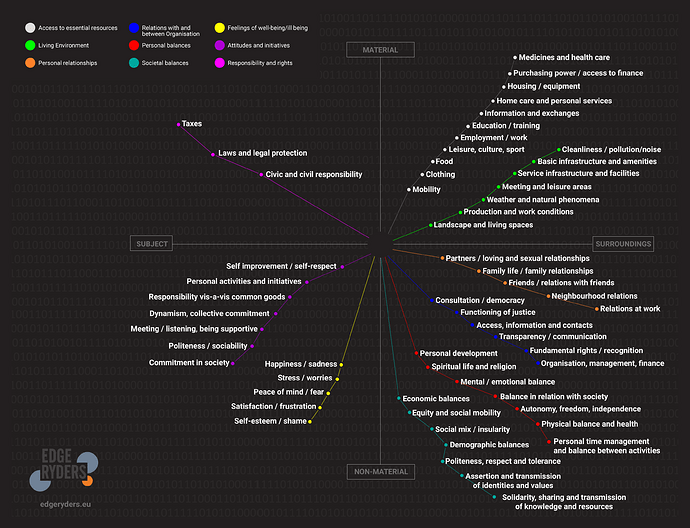
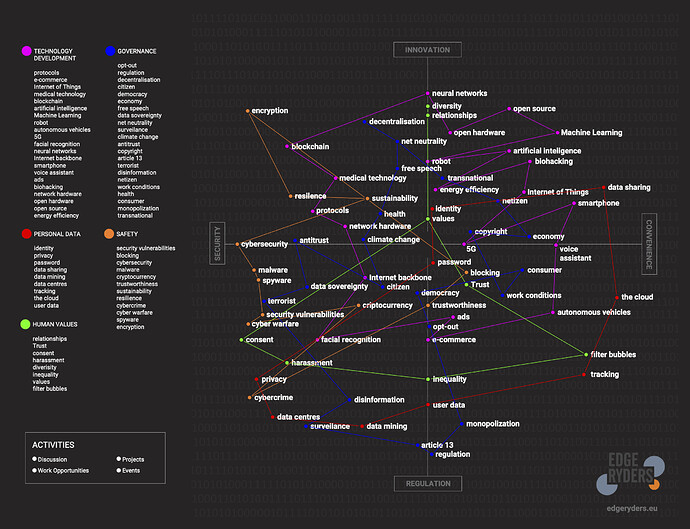
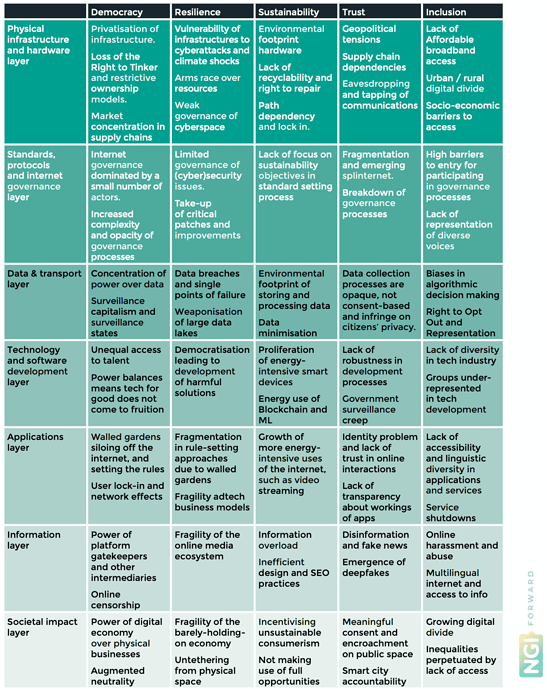
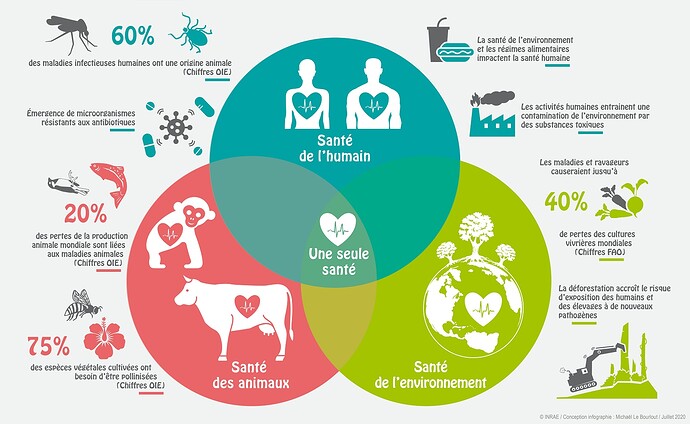
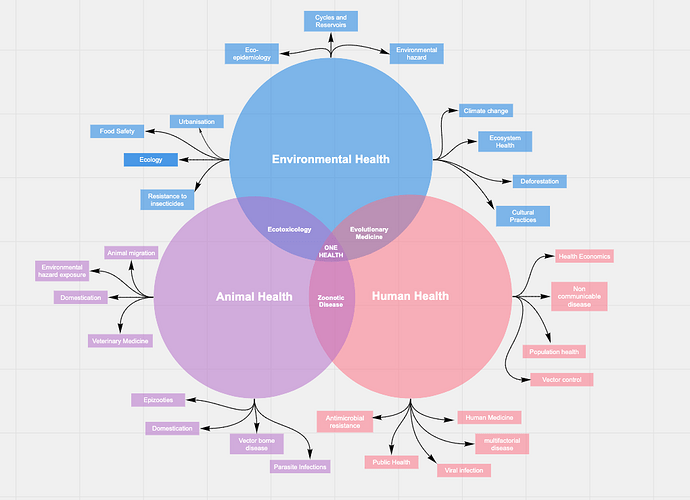
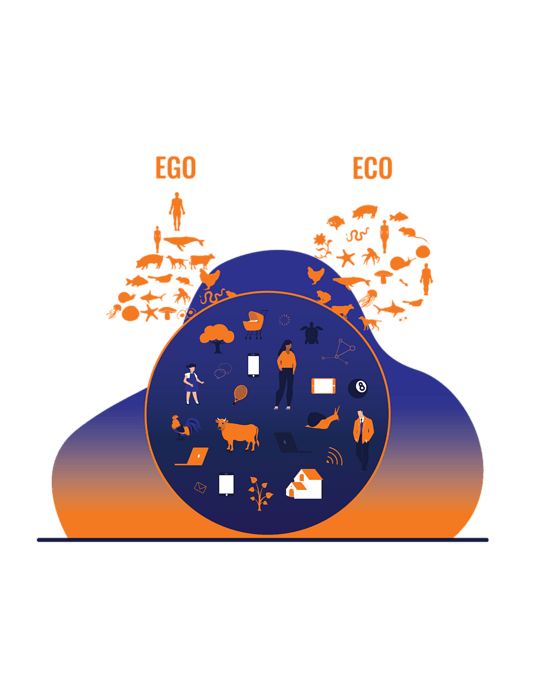
 The above gives context to some questions I will be asking you over the coming week.
The above gives context to some questions I will be asking you over the coming week.